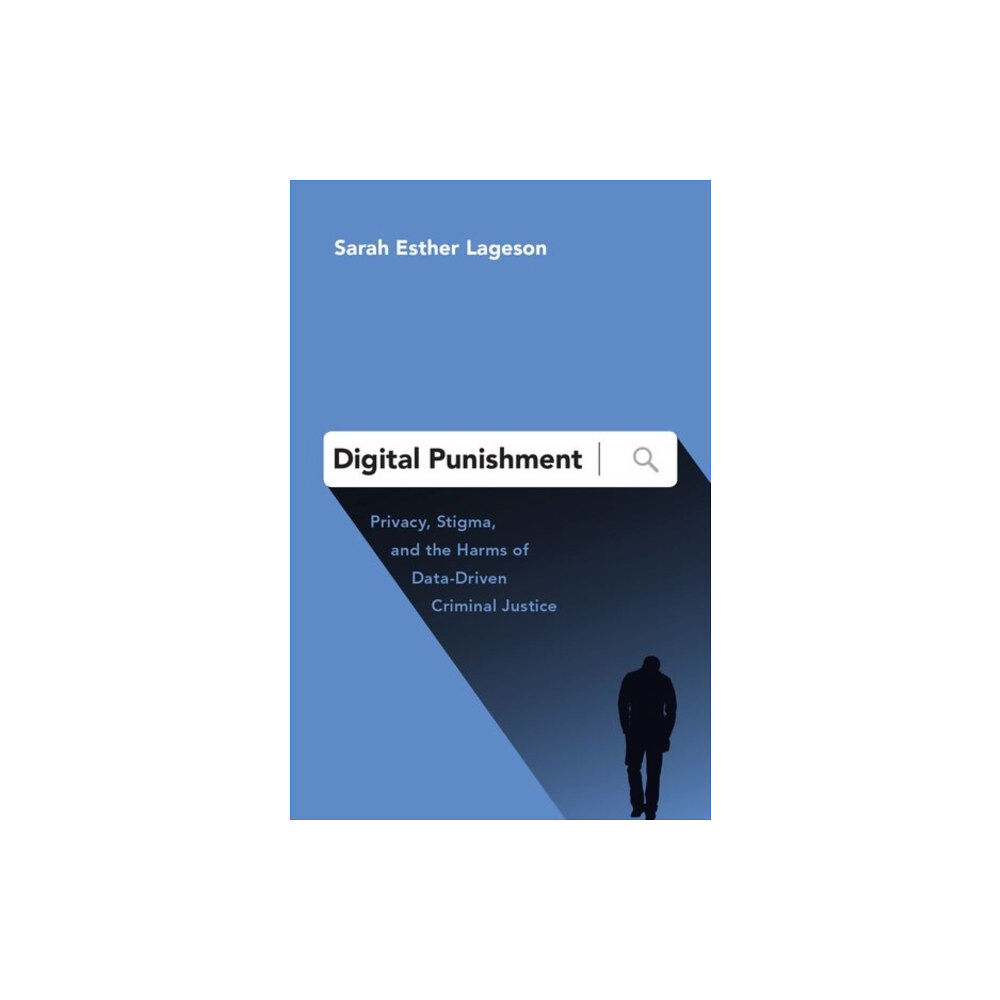- Hem
- Böcker
- Kurslitteratur
- Samhälle & Politik
- Digital Punishment (inbunden, eng)

Digital Punishment (inbunden, eng)
The proliferation of data-driven criminal justice operations creates millions of criminal records each year in the United States. Documentin...
509 kr
555 kr
Slut i lager
- Fri frakt
Fri frakt över 299:-
Snabb leverans
Alltid låga priser
Produktbeskrivning
The proliferation of data-driven criminal justice operations creates millions of criminal records each year in the United States. Documenting everything from a police stop to a prison sentence, these records take on a digital life of their own as they are collected by law enforcement and courts, posted on government websites, re-posted on social media, online news and mugshot galleries, and bought and sold by data brokers.
The result is "digital punishment," where mere suspicion or a brush with the law can have lasting consequences. In Digital Punishment, Sarah Esther Lageson unpacks criminal recordkeeping in the digital age, as busy and overburdened criminal justice agencies turned to technological solutions offered by IT companies over the last two decades.
These operations produce a mountain of data, including the names, photographs, and home addresses of people arrested or charged with a crime, transforming millions of paper records into a digital commodity. Regardless of factual or legal guilt, these records rapidly multiply across the private sector background checking and personal data industries.
Emboldened by public records laws designed for paper-based systems, criminal record data has become an extremely valuable resource for employers, landlords, and communities to monitor criminal behavior and assess other people. But while transparency laws were originally designed to allow governmental watchdogging, digital punishment has redirected our gaze toward one another.
Hundreds of interviews detailed in this book reveal the consequences of digital punishment, as people purposefully opt out of society to cope with privacy and due process violations. As criminal histories impact nearly every aspect of private and civic life, the collateral consequences of even the most minor records are much more than barriers to employment and housing.
For the criminal record-holder, the messy entanglement of government bureaucracy is nothing compared to the jurisdiction-less haze of the internet. Drawing on empirical data, interviews, and review of case law, this book powerfully demonstrates that addressing digital punishment will require a direct acknowledgement of privacy and dignity in the context of public accusation, and a reckoning of how rehabilitation can actually occur in a society that never forgets.
The result is "digital punishment," where mere suspicion or a brush with the law can have lasting consequences. In Digital Punishment, Sarah Esther Lageson unpacks criminal recordkeeping in the digital age, as busy and overburdened criminal justice agencies turned to technological solutions offered by IT companies over the last two decades.
These operations produce a mountain of data, including the names, photographs, and home addresses of people arrested or charged with a crime, transforming millions of paper records into a digital commodity. Regardless of factual or legal guilt, these records rapidly multiply across the private sector background checking and personal data industries.
Emboldened by public records laws designed for paper-based systems, criminal record data has become an extremely valuable resource for employers, landlords, and communities to monitor criminal behavior and assess other people. But while transparency laws were originally designed to allow governmental watchdogging, digital punishment has redirected our gaze toward one another.
Hundreds of interviews detailed in this book reveal the consequences of digital punishment, as people purposefully opt out of society to cope with privacy and due process violations. As criminal histories impact nearly every aspect of private and civic life, the collateral consequences of even the most minor records are much more than barriers to employment and housing.
For the criminal record-holder, the messy entanglement of government bureaucracy is nothing compared to the jurisdiction-less haze of the internet. Drawing on empirical data, interviews, and review of case law, this book powerfully demonstrates that addressing digital punishment will require a direct acknowledgement of privacy and dignity in the context of public accusation, and a reckoning of how rehabilitation can actually occur in a society that never forgets.
| Format | Inbunden |
| Omfång | 256 sidor |
| Språk | Engelska |
| Förlag | Oxford University Press Inc |
| Utgivningsdatum | 2020-08-13 |
| ISBN | 9780190872007 |
Specifikation
Böcker
- Inbunden, 256, Engelska, Oxford University Press Inc, 2020-08-13, 9780190872007
Leverans
Vi erbjuder flera smidiga leveransalternativ beroende på ditt postnummer, såsom Budbee Box, Early Bird, Instabox och DB Schenker. Vid köp över 299 kr är leveransen kostnadsfri, annars tillkommer en fraktavgift från 29 kr. Välj det alternativ som passar dig bäst för en bekväm leverans.
Betalning
Du kan betala tryggt och enkelt via Avarda med flera alternativ: Swish för snabb betalning, kortbetalning med VISA eller MasterCard, faktura med 30 dagars betalningstid, eller konto för flexibel delbetalning.
Specifikation
Böcker
- Format Inbunden
- Antal sidor 256
- Språk Engelska
- Förlag Oxford University Press Inc
- Utgivningsdatum 2020-08-13
- ISBN 9780190872007
